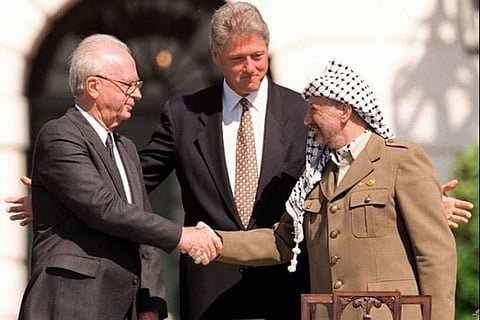

It has been widely reported that as a condition for a potential Saudi-US-Israel deal the Israelis will commit to making gestures towards a two-state solution. This was the original vision, 30 years ago, when the Oslo accords were signed, when it seemed that a Palestinian state recognised by, and living side-by-side with Israel, might indeed be a realistic prospect by the end of the 20th century.
Now, in the third decade of the 21st century, the Palestinian leadership merely hopes for some more of the occupied West Bank to be handed over to its control. A sovereign Palestinian state does not seem to be on the agenda.
The Oslo accords, which were secretly negotiated between the Palestine Liberation Organisation (PLO) and the Israeli government between 1992 and 1993, provided for three phases of negotiations. The first involved a withdrawal of Israeli forces from the Jericho area in the West Bank and most of Gaza together with the creation of institutions for Palestinian self-government.
Second there would be an interim agreement which would create an elected Palestinian Council and expand the area under its direct control. Third there would be permanent status talks to resolve the difficult issues of the status of Jerusalem, settlements, refugees, borders and relations with neighbouring states.
But when these issues were eventually discussed at the Camp David talks in 2000, neither Palestinian leader Yasser Arafat or Israeli prime minister Ehud Barak could rise to the occasion and strike a deal.
This was no doubt due to the ambiguity of the accords on questions of self-determination and statehood. The text referred to “mutual legitimate and political rights”. But while Israel and the PLO recognised each other, it was as negotiating parties rather than as partners with legitimacy and the right to self-determination exercised through two sovereign states.
In 1993 there was much talk about the creation of a new Middle East which would be part of the post-cold war world order. The ambiguities of the Oslo accords would be resolved by good faith negotiations in an atmosphere where many talked about the “peace dividend”.
But there was a darker side to the early 1990s. The Balkan wars (1991-1995) were markedly violent conflicts which were the product of xenophobia, racism and religious extremism. As the 1990s progressed it was these features, rather than a peaceful democratic dispensation, which characterised the post-communist world.
For Israel and Palestine, the optimism present in 1993 was to dissipate with rising violence. Within three years we saw the assassination of Israeli prime minister Yitzhak Rabin by a Jewish terrorist, the massacre of Muslims while praying in Hebron by an Israeli settler and Hamas suicide terrorist attacks against Israeli civilians in February and March 1996. By May 1996 the Israeli government that had negotiated the Oslo accords had been defeated at the polls by Benjamin Netanyahu who announced he would “lower Palestinian expectations”.
In the years since, there has been the second intifada (2000-2004), the reoccupation by Israel of the West Bank (beginning in autumn 2000) and three wars between Hamas and Israel. The Palestinian leadership has fractured, with Fatah (the main component of the PLO) running the West Bank while Hamas is in control of Gaza.
Israeli politics, meanwhile, has moved sharply to the right. This has included 12 years of populist Netanyahu governments and, since the 2022 elections, the formation of an extreme rightwing government containing ministers who are openly racist – some of them even convicted of anti-Palestinian terrorism.
Read more: Israeli elections: Benjamin Netanhayu set to return – with some extreme new partners
A paradox of the past 30 years has been that while the negotiations promised by Oslo have failed, the Palestinian institutions created by the Oslo process have persisted.
The Palestinian Authority created by the Cairo Agreement in 1994 remains in place with Mahmoud Abbas as president. The Legislative Council created in 1995 remains in session in Ramallah – even if there have been no elections since 2006.
Since 2012, the United Nations has recognised Palestine as a state. It is now recognised by about 140 countries and has joined international organisations only open to states, such as the International Criminal Court.
It has also been the case that there have been some initiatives to improve the situation. In 2005, then prime minister Ariel Sharon removed Israeli settlers and troops from Gaza. Whether he had a plan for a deal with the Palestinians we shall never know, as he collapsed and died shortly after.
His successor Ehud Olmert offered Abbas a comprehensive plan for a Palestinian state in 2008, but the Palestinian president walked away from it.
A resolution to the Palestinian-Israeli conflict has proved elusive due to a combination of the specific issues and the xenophobic age in which we live. Oslo offered an opportunity which could have worked if only both sides could break with traditions of mutual denial of the national aspirations of the other.
In December 1995, I stood in the streets of Ramallah and watched as a Palestinian procession reclaimed the city from the Israeli occupiers. It was a glimpse of a possible future. The enthusiasm of the crowds for emancipation underlines what is possible when two peoples recognise that each has the right to self-determination.
The recent mass pro-democracy movement in Israel offers a possible turning point against populism and xenophobia. However it needs to grow into a movement that can not only save Israeli democracy from the attacks of the right but also from the corrupting influence of 56 years of occupation. It will only be successful if it liberates both Israel and Palestine.
Written by John Strawson